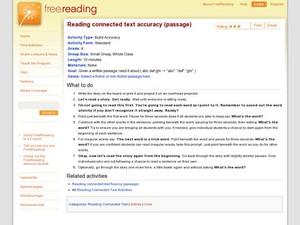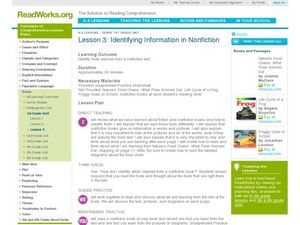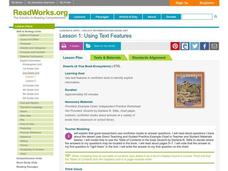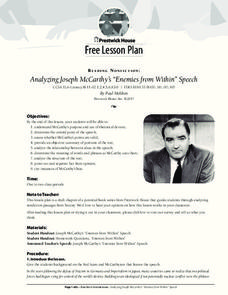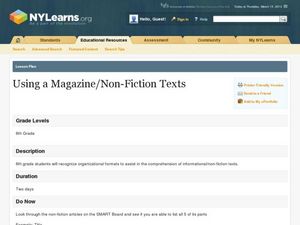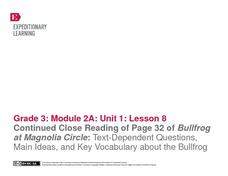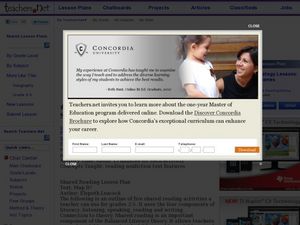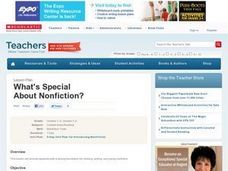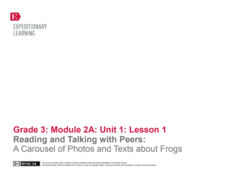Curated OER
Teach Text Features & Read Nonfiction
Elementary schoolers examine the components of reading nonfiction. They use think-alouds to help them complete reading the selected sections. They also identify text features as they read.
Curated OER
Locate Key Information in Nonfiction Text
Interpret nonfiction text with your class. Readers use key information found in nonfiction text to answer questions and problem solve. They utilize the chapter headings, diagrams, glossary, maps, and captions as well as the table of...
Curated OER
Identifying Features of Nonfiction Text
Learners explore nonfiction text. They identify the cover, title page, and table of contents of a nonfiction book. Pupils work in groups to create a chapter for a nonfiction class book about heroes.
Curated OER
Reading Connected Text Accuracy (Passage)
Use some of these 80-word passages to practice reading fluency with your beginners. Project the text so all learners can see it, pointing to each word as scholars recite them one at a time. Warn readers of irregularly spelled words by...
Curated OER
Identifying Information in Nonfiction
Second graders investigate information in non-fiction texts. They review the features of a non-fiction text and read the book Nature's Food Chains: What Polar Animals Eat. Pupils discuss the text features and write down one fact they...
Curated OER
Characteristics of Nonfiction
The second instructional activity in a series from ReadWorks.org, this instructional activity continues to explore the difference between fiction and nonfiction texts. The instructional activity opens with the teacher reviewing a class...
Curated OER
Using Text Features
Investigate a "table of contents" with your students! They read the table of contents in Deserts by Darlene R. Stille and predict where the answers to specific questions might be found. Learners complete a worksheet in which they find...
National Council of Teachers of English
Timelines and Texts: Motivating Students to Read Nonfiction
With the emphasis on incorporating more nonfiction in language arts classes the question arises about how to design activities that motivate kids to engage with informational text. How about an assignment that asks class members to...
Prestwick House
Reading Nonfiction: Analyzing Joseph McCarthy's "Enemies from Within" Speech
Looking for a lesson that teaches class members how to analyze nonfiction? Use Joseph McCarthy's famous "Enemies from Within" speech as a instructional text. Worksheet questions direct readers' attention to the many historical...
EngageNY
Mid-Unit Assessment: Close Reading of Bullfrog at Magnolia Circle: Bullfrog Life Cycle
The sixth lesson plan in this Bullfrog at Magnolia Circle unit assesses your third graders' ability to read and understand informational text. The included assessment asks learners to take notes about the main idea and supporting...
EngageNY
Close Reading of Bullfrog at Magnolia Circle: Main Ideas about the Bullfrog
As your class reaches the end of the book Bullfrog at Magnolia Circle, the seventh lesson in this literary unit helps third graders transition from reading narrative to expository writing. Scholars develop their note-taking skills...
Curated OER
Using a Magazine/Non-Fiction Texts
Working with magazine articles and other informational texts, students identify the parts of a non-fiction work. The learners use SMART board files to guide instruction, as well as a transition to writing their own non-fiction article in...
EngageNY
Close Reading of Bullfrog at Magnolia Circle: Text-Dependent Questions, Main Ideas, and Key Vocabulary about the Bullfrog
As your 3rd grade class finishes reading Bullfrog at Magnolia Circle, the eighth lesson plan of this unit helps readers from an understanding of the very specific information on the final page of the book. As with the entire unit,...
Curated OER
Organizational Structures of Nonfiction Text/Graphic Organizers
Fifth graders review the characteristics of a nonfiction text. In this language arts lesson, 5th graders understand that one can use a specific graphic organizer to help them in understanding an organizational structure. For example, in...
Read Works
Signal Words in Expository Text
Signal words are one way that authors make the relationships between their ideas clear. Allow your learners the chance to investigate cause and effect in texts by identifying signal words. They locate and analyze cause-and-effect...
EngageNY
Close Reading: Paragraph 4 of “Refugee and Immigrant Children: A Comparison”
Why is reading a text closely a helpful skill? Using the 13th of 20 lessons from the Grade 8 ELA Module 1, Unit 2 series, scholars continue reading the informational text "Refugee and Immigrant Children: A Comparison." They work with...
Curated OER
Using Social Studies in Five Shared Reading Lessons: Geography
After several short 15-minute mini-lessons, your learners will gain an understanding of the characteristics of a non-fiction text. Using the book Map It by Elspeth Leacock, your class will become acquainted with non-fiction terms...
Curated OER
Nonfiction Text Features
Identify features of a nonfiction article in this language arts lesson. Middle schoolers apply comprehension strategies as they read the parts of the article, and analyze the author's key points. Additionally, they examine information in...
Curated OER
Three-Level Reading Guide- The Apaches: People of the Southwest
A reading guide designed for Jennifer Fleischner's nonfiction text, The Apaches: People of the Southwest, provides readers with three levels of comprehension questions meant to encourage higher-level thinking.
Curated OER
What's Special About Nonfiction?
Young scholars examine the difference between nonfiction and fictional writing. They identify the characteristics of nonfiction literature and examine how a nonfiction textbook organizes information.
Curated OER
Using a Title to Determine Main Idea (Nonfiction)
Young readers explore a nonfiction text for its main idea. They will listen to the book Animal Sight by Kirsten Hall, and then observe as the teacher models a main idea think-aloud. Later, for independent practice, they listen to the...
Curated OER
Mixed Bags: Fiction and Nonfiction
The second in a series of three lessons from Scholastic comparing and contrasting fiction and nonfiction, this activity requires learners to read, write, and compare two books independently. After briefly reviewing the features of...
EngageNY
Reading and Talking with Peers: A Carousel of Photos and Texts about Frogs
Frogs are the theme of a lesson plan that challenges scholars to examine photographs, read informational texts, then ask and answer questions. Scholars work collaboratelively as they rotate through stations, discuss their observations,...
EngageNY
Analyzing Text Structure: “The Shakespeare Shakedown”
Pupils continue reading and discussing Simon Schama's article "The Shakespeare Shakedown." They work together to analyze the article's paragraph structure, completing a note-catcher worksheet.



